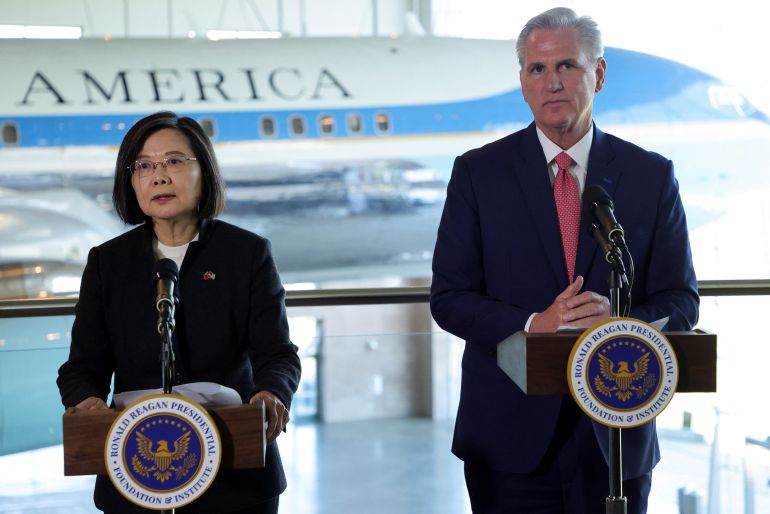
After Taiwan's president visits the U.S. China deploys warships near the island and warns Washington not to cross the red line
China on Thursday sent warships to the waters around Taiwan after deploying an aircraft carrier, vowing a "firm" response after the meeting between Taiwan's president and the US House of Representatives speaker in California, Taiwan's defense ministry said.
China also warned the United States not to cross the red line in the two countries' relations regarding Taiwan, according to a statement from the Chinese parliament's Foreign Affairs Committee, in response to a meeting between members of the US Congress, including House Speaker Kevin McCarthy, and Taiwanese President Tsai Ing-wen in California on Wednesday.
Beijing, which has long threatened to retaliate if such a meeting takes place, deployed an aircraft carrier near Taiwan hours before the meeting.
Chinese Foreign Ministry spokeswoman Mao Ning said, "The United States and Taiwan have conspired to strengthen their ties, which seriously infringes on Chinese sovereignty and is a bad sign of support for Taiwanese separatists."
China will take firm and strong measures to resolutely defend its national sovereignty and territorial integrity, she said during a press conference on Thursday.
Red line
"Ignoring China's strong opposition, McCarthy and other members of the U.S. Congress insisted on meeting with Tsai, who is on a transit trip through the United States," a statement from the Chinese parliament's Foreign Affairs Committee said.
The US meeting with Taiwan's leader seriously violated the one-China principle and the three joint statements between Beijing and Washington, and also seriously violated international law and basic norms governing international relations, the statement said, stressing that the Taiwan issue lies at the core of China's core interests, the political basis between Beijing and Washington and the first red line that must not be crossed in the two countries' relations.
The Chinese parliament noted that the meeting severely undermined China's sovereignty and territorial integrity, reiterating its strong condemnation and opposition to the US move, and emphasizing that there is only one China in the world, that Taiwan is an integral part of its territory, and that the PRC government is the only legitimate government representing all of China.
The parliament emphasized Beijing's firm opposition to all forms of official interaction between the U.S. and Taiwan, and urged the U.S. government and Congress to stop distorting the one-China principle.
Three more warships were spotted on Thursday at around 6:00 a.m. (22:00 GMT) in the strait between China and the democratically-ruled island, Taiwan's Defense Ministry said, adding that an anti-submarine helicopter crossed Taiwan's air defense zone. China has also deployed coast guard vessels to conduct extraordinary patrols that Taipei has protested.
In August, Beijing conducted unprecedented military maneuvers around Taiwan during a visit to the island by Democratic former U.S. House Speaker Nancy Pelosi that angered China.

American response
The US State Department said Beijing should choose the path of "diplomacy" rather than "pressure" on Taiwan, describing Tsai's visit as a "transit" on her way to and from Latin America, "no reason to turn it into something else or use it as an excuse to overreact."
"We continue to urge Beijing to stop its military, diplomatic and economic pressure on Taiwan and opt for a constructive diplomatic practice," Foreign Ministry spokesman Vedant Patel told reporters.
"We remain committed to maintaining open channels of communication to prevent the risk of any kind of miscalculation," he said, acknowledging that there are differences between the US and China over Taiwan, but saying the two powers have managed those differences for four decades.
Taiwanese Defense Minister Chiu Kuo-shing said there is a Chinese aircraft carrier within 200 nautical miles of Taiwan's eastern coast, noting that the timing of the Shandong's deployment is sensitive, but did not indicate that any maneuvers were observed in the vicinity of the warship.
"When an aircraft carrier goes out, there are usually takeoffs and landings, but we haven't seen any landings or takeoffs" so far, he said.
The tensions between Beijing and Taipei coincide with a visit by European Commission President Ursula von der Leyen and French President Emmanuel Macron to Beijing, where the latter met with his counterpart Xi Jinping.
It also comes on the same day that an eight-member US congressional delegation arrived in Taiwan for talks on trade and security.
Beijing, which adheres to the principle of one China, considers the island of Taiwan, with a population of 23 million, to be an integral part of its territory, does not rule out taking it back by force if necessary, and opposes any official contact between Taipei and other countries.
Only 13 countries recognize Taiwan, including Belize and Guatemala, which Tsai visited during her tour after a first stop in New York.
Source: Agencies








